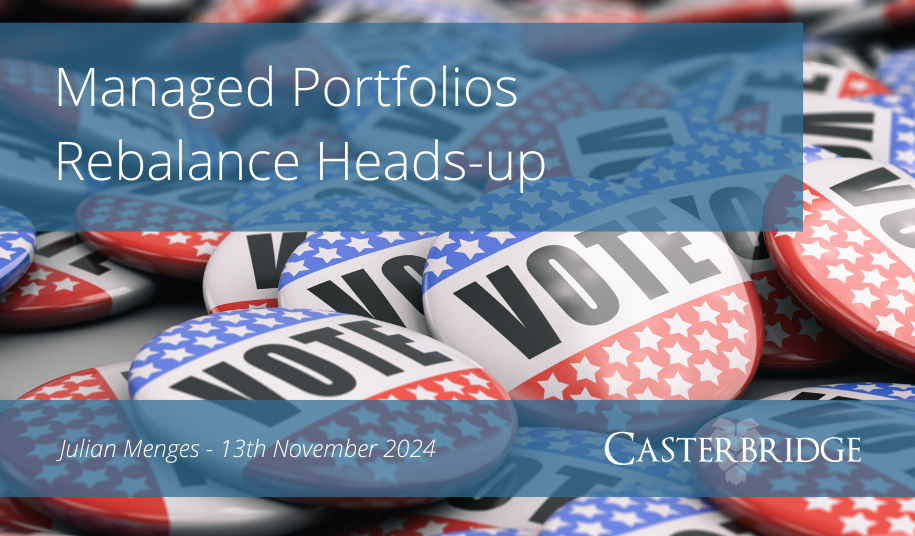Over the next few days Julian Menges, Head of MPS at Casterbridge, and the team will be making some tactical investment changes (commonly known as a rebalance) to the Managed Portfolio range. Below is a summary of the headline changes and the rationale driving the decisions.
Summary of portfolio changes
Increasing equities now that some of the clouds of geopolitical uncertainty are lifting,
with a greater increase in equities for higher risk portfolios
Trimming Bonds and nudging up Alternatives where we have higher conviction for positive returns with low volatility over the coming year
Move to be fully invested, having previously held cash in some portfolios
Rationale
We have written about our two biggest concerns over the last three years being rising geopolitical risks and the return of higher inflation. Both proved timely.
The election of Trump as the new US President should reduce the heat out of many of these deepening global conflicts, which will be positive towards global trade and the ability to control inflation. In addition, the size of the win, and the Republicans controlling both the Senate and House (looking likely, but not yet confirmed at the time of writing) means that their legislation for economic growth should be passed quickly and decisively. This is positive for equity markets.
In addition, the removal of uncertainty around the US election, and that we now have the UK Budget behind us, provides better visibility on the direction of fiscal policy in the largest and 6th largest economies in the world. This follows on from positive news from China, being the second largest, a few weeks ago. This greater clarity is welcomed by business, albeit there are also new challenges that they and consumers now have to face, such as expected tariffs in the US and significant tax rises in the UK.
We’ve highlighted previously our concern about the resurgence in inflation, not only the initial jump which we have now experienced, but then the likelihood of a rise to a new higher level on a more sustained basis. Plans announced by both President-elect Trump and Chancellor Reeves should see stronger economic growth, but also this higher inflation. While base rates are expected to fall in the near term, the reduction may not be as significant as hoped and higher bond yields are likely longer term, driven in part by ballooning debt levels and interest payments – the annual cost of financing the U.S. debt has doubled over the last two years to over $1 trillion per year and shows no signs of slowing down.
Portfolio changes
The reduction in geopolitical risk and greater clarity on the government policy in the US and UK gives us confidence to increase equities. Risks remain in numerous leading economies, and valuations stretched in certain sectors, and so we are waiting for better entry points before moving overweight.
Increasing equities from a small underweight to neutral
Increase in US and reduction in UK. We are adding to US exposure, and in particular mid-small cap and value funds which are focused more on the domestic economy which should be a significant beneficiary of the policies which Trump will implement. We are continuing our long-term reduction in UK equities to improve portfolio diversification and opportunities, but this pace remains gradual given the excellent opportunities our UK managers continue to find on attractive valuations.
At a fund level we are selling one US mid-cap fund further to the departure of one of its lead managers and introducing a US small-cap fund with an excellent team and track record. We are also exploring an additional fund in this space.
The flexibility of our process allows us to place greater emphasis on funds and styles with greater upside potential in the higher risk portfolios, and we continue to do this in areas such as US small-mid cap and frontier emerging markets.
Alternatives overweight and Bonds underweight
Although bond yields have risen in recent weeks on concern about higher inflation, it remains difficult to have much confidence where yields will be in (say) 1 or 2 years, particularly with US and UK governments in particular increasing debt levels at such a fast pace. Bonds are supposed to be “low risk”, but few can argue that after the price falls and volatility we have seen in the last 3 years.
We believe there is still the potential of more upside risk in yields and so are making a small reduction.
This is mainly through the reduction in US Treasuries, which capitalises on the recent recovery in the US$. In addition, we have much higher conviction in our selection of Alternative funds, such as long-short equity funds operating in different markets. We expect these to continue to produce steady positive returns with low volatility.
Reducing Cash
A decrease in some portfolios (most portfolios now have zero) as we prefer to be fully invested with the opportunities we can find.
Important Information
This article is for information only and does not constitute advice or recommendation and you should not make any investment decisions based on it. The views and opinions of this article are those of Casterbridge at the time of writing and may change without notice. Any opinions should not be viewed as indicating any guarantee of return from investments managed by Casterbridge nor as advice of any nature. It is important to remember that past performance and the value of an investment, and any income from it, may go down as well as up and the investor may not get back the original amount invested.





